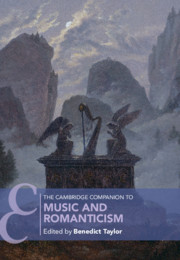Book contents
- The Cambridge Companion to Music and Romanticism
- Cambridge Companions to Music
- The Cambridge Companion to Music and Romanticism
- Copyright page
- Contents
- Figures
- Tables
- Musical Examples
- Contributors
- Preface
- Chronology
- Part I Horizons
- Part II Worlds
- Part III Aesthetics
- Part IV Practices
- 14 Romantic Languages
- 15 Romantic Forms
- 16 Romanticism and the Ideal of Song
- 17 Music Staged and Unstaged
- 18 Romanticism and Performance
- Part V Histories
- Select Bibliography
- Index
- References
16 - Romanticism and the Ideal of Song
from Part IV - Practices
Published online by Cambridge University Press: 06 August 2021
- The Cambridge Companion to Music and Romanticism
- Cambridge Companions to Music
- The Cambridge Companion to Music and Romanticism
- Copyright page
- Contents
- Figures
- Tables
- Musical Examples
- Contributors
- Preface
- Chronology
- Part I Horizons
- Part II Worlds
- Part III Aesthetics
- Part IV Practices
- 14 Romantic Languages
- 15 Romantic Forms
- 16 Romanticism and the Ideal of Song
- 17 Music Staged and Unstaged
- 18 Romanticism and Performance
- Part V Histories
- Select Bibliography
- Index
- References
Summary
This chapter considers the quintessential Romantic genre of art song. After a brief background in late eighteenth-century song style, it describes the expansion and deepening of the genre that began in the nineteenth century with the oeuvre of Franz Schubert. As other composers imitated and developed Schubert’s approach to song, poems in many languages were set to music. Across the century, these texts represent the changing emphases and concerns of Romantic poetry. The chapter outlines some central ideas of early German Romanticism: interdisciplinary collaboration, the idealisation of the fragment, and the importance of subjective experience. The gathering of short literary fragments into collections is compared to the song cycle, which groups songs to create a larger story or impression. Three case studies – songs by Schubert, Fauré, and Schumann – are explored to show how various poets and composers used scenes of nature metaphorically to express larger topics of pantheism, intimacy, and mystic unity.
- Type
- Chapter
- Information
- The Cambridge Companion to Music and Romanticism , pp. 277 - 295Publisher: Cambridge University PressPrint publication year: 2021
References
Further Reading
- 1
- Cited by



